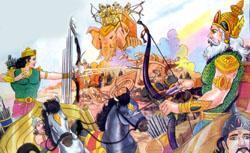|
|
| Kurukshetra and After |

On the first day, with Dushahsana leading the Kauravas and Bhima the Pandavas, the armies joined battle. Bhishma's advance could not be checked, and it seemed that the Pandavas would be routed completely on the very first day.
And after many hours of fearful fighting, a terrible duel took place between Arjuna's son, Abhimanyu, and Bhishma, the grandsire of the clan. The young Abhimanyu fought with astonishing skill and courage. Here was one who did not know what fear was, and danger only goaded him to go out and meet it! Men looked at the boy in wonder, for he seemed to be everywhere, at all times, fighting in turn wit bow and mace and sword, with such dexterity that it took the combined efforts of Bhishma, Shalya, Kripa and Kirtivarman to beat him back. Then the enemy turned their attack on these, and in the fierce fight that followed, the noble sons of Virata were slain. Bhishma followed up the victory by leading an attack on the Pandava army and routing it completely.
On the second day, however, the Pandavas recovered their strength because of the brave leadership and the determination of Arjuna, Dhrishtadyumna and Bhima. Arjuna met the invincible Bhishma in battle; but so well matched were they that neither could win. Besides, though he had steeled himself to destroy Bhishma, at the sight of their brave scion, who had been more than a father to him, Arjuna could not bring himself to put forth his best effort. The battle thus ended in an impasse. But that same day, on another front, the Pandavas fighting under Dhrishtadyumna and Bhima won a great victory.
Thus the great battle continued. Each morning the commanders of the two armies arranged their forces in a formation most suited to the plans for the day. Each night the remaining forces retired to their camps to recoup and nurse their wounds. Sweet music was played for an hour after sunset. This hour was spent without a word of war and was a time of peace and quiet.
On the ninth day of the battle Duryodhana went to Bhishma's tent and spoke with great bitterness about the way the battle was shaping. His sharp words hurt Bhishma and he replied, "Why do you speak thus to me, when I am pouring out my life for you? On numerous occasions I tried to advise you on the right course of action but you did not heed my words. I, shall do my utmost for you, but I will not kill the sons of Pandu, or Shikhandi who was born a girl. But for these I will fight all the warriors who are opposed to you. Now fight like a Kshatriya and may glory be yours!"
The battle started and Bhishma fought bravely, scattering the Pandava forces wherever he went. Seeing this, Krishna halted the chariot and said to Arjuna, "Partha for you and your brothers this day has come after thirteen long years of exile. Do not hesitate to do your duty as a Kshatriya. Go, kill to relieve Bhishma now." But Arjuna's heart was not in the encounter that followed. He just could not bring himself to attack his beloved grandfather. Bhishma, on the other hand, fought fiercely. His arrows coming down thick and fast covered Arjuna's chariot completely. But Krishna was unperturbed and drove the chariot skilfully. Arjuna's shafts shattered Bhishma's bow several times, but each time Bhishma renewed it. Seeing that Arjuna was not putting forth his best, Krishna exclaimed, "Arjuna, you are not fighting like you should!" And, climbing down from his chariot and went over to Bhishma. | |
|